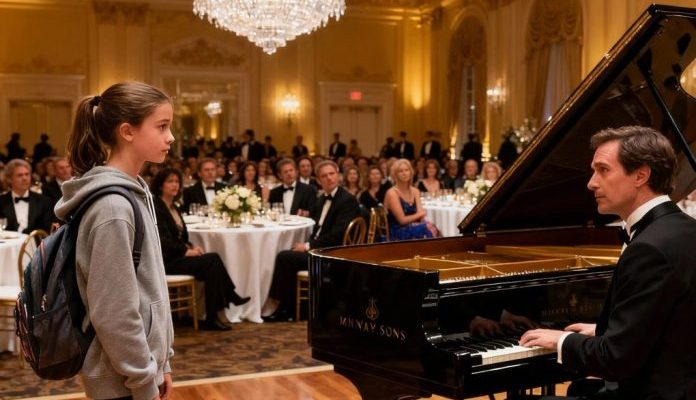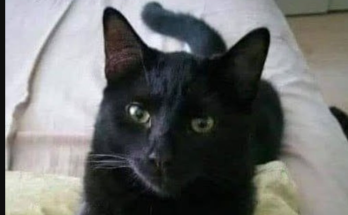The ballroom glittered like another universe.
Crystal chandeliers shimmered from above, scattering golden light across marble floors. Guests in tailored suits and sparkling gowns drifted between tables covered in silver and glass. Laughter, music, and the clinking of crystal filled the air — the comfortable sounds of people who had never truly known hunger.
At the edge of it all, a small barefoot girl stood quietly, clutching a torn backpack to her chest. Her name was Amelia Grace, just twelve years old, and she hadn’t eaten a proper meal in two days. From outside the hotel, she had followed the faint sound of a piano — a sound she loved since she was little — until she found herself here, staring at a world she didn’t belong to.
The girl at the door
“Excuse me,” she whispered to the guard at the entrance, her voice barely audible. “Can I… can I come in just for a minute? I only want to listen.”
The guard frowned. “This is a private charity gala, sweetheart. You can’t just walk in.”
But something in her eyes — a mix of fear and courage — made him hesitate. When one of the servers passed by, Amelia caught the aroma of roasted chicken and warm bread. Her stomach twisted painfully.
Then, in a voice so soft it was almost lost under the music, she asked,
“If I play the piano for you… could I have a plate of food?”
A silence no one expected
The room went quiet. People turned their heads. A few chuckled. Others looked uncomfortable. But the host, a tall man in a navy tuxedo, raised an eyebrow with curiosity.
“You play?” he asked.
Amelia nodded. “A little. My mom taught me before she got sick.”
Something about her tone silenced the laughter. The host gestured toward the grand piano in the center of the room — a magnificent black Steinway that gleamed under the chandelier’s light.
“Go ahead, then,” he said. “Let’s hear you.”
The first note
Amelia walked slowly through the crowd. Every step echoed. She could feel dozens of eyes following her — polished shoes, expensive perfume, a thousand-dollar watch ticking nearby. Her hands were shaking when she lifted the piano lid.
For a heartbeat, she just stared at the keys, her reflection trembling on the glossy surface. Then she took a deep breath and placed her fingers on the ivory.
The first note was soft — hesitant, almost shy. But the second came stronger. Then another. Within moments, the melody grew, blooming like a sunrise through silence.
It wasn’t a piece anyone recognized. It was something she made up — a song of cold nights, of empty pockets, of her mother humming lullabies by candlelight. The notes seemed to float above the crowd, weaving through every heart in the room.
People forgot to breathe.
The song that fed her soul
The waiter who’d laughed earlier now stood frozen in the doorway. The host’s wife had tears in her eyes. Even the string quartet, who had been hired to perform that evening, lowered their instruments to listen.
Amelia played as if the piano were alive — her tiny hands moving with the grace of someone who had nothing left but music.
When the last note faded, the silence that followed felt almost sacred. Then came the applause — hesitant at first, then overwhelming.
People stood to their feet, clapping until the walls trembled. Some cried openly. Others hurried to the little girl with questions — Who was she? Where did she come from?
The moment that changed everything
The host himself approached, eyes glistening. “What’s your name, sweetheart?”
“Amelia,” she said softly.
“And where’s your mother?”
“She’s sick. I was just trying to find something to eat.”
Without another word, he motioned to the caterers. Within minutes, a warm plate was brought to her — roasted chicken, vegetables, and a slice of bread. Amelia whispered “thank you,” but before she could take a bite, a woman touched her shoulder.
“I’m a music teacher,” the woman said. “Would you come play for me tomorrow? I think the world should hear you.”
That night, Amelia didn’t just earn a meal — she found a doorway into a life she could never have imagined.
From hunger to harmony
Over the next few months, the guests from that night began to sponsor her lessons. The local conservatory offered her a scholarship. Newspapers picked up the story of “the barefoot pianist.” Videos of her playing began to spread online, and soon, invitations arrived from across the country.
By sixteen, Amelia was performing in concert halls. At eighteen, she played her first symphony in front of a sold-out crowd. The same black Steinway — the one she touched for the first time that night — was gifted to her by the man who once hosted the gala.
And through it all, she never forgot the question that started everything:
“Can I play for a plate of food?”
The return to the ballroom
Ten years later, the same hotel hosted another charity event — this time, for children living in poverty. And at the center of the room stood Amelia Grace, now a celebrated pianist, dressed in a flowing white gown.
Before beginning her performance, she smiled at the crowd and said,
“Once, I stood right there by that door — barefoot and hungry. Someone gave me a chance. Tonight, I hope we can give that same chance to others.”
When her fingers touched the piano again, the melody was even more beautiful — a blend of gratitude, hope, and memory.
The same chandeliers glowed above, but now, she belonged under them. The audience didn’t just hear music that night — they heard the echo of kindness and courage that can change a life forever.




